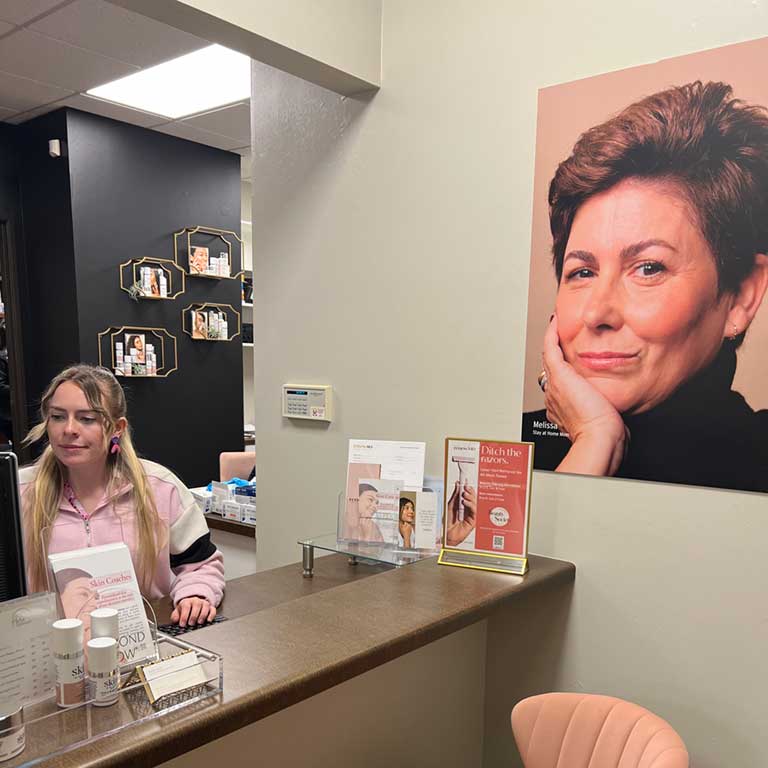Treating The Skin Based on Skin Type and Skin Tone
In this blog, we’ll cover:
- Treatments for different skin types and skin tones
- How to treat and care for skin of color
- Different ways to identify your skin tone
On The Skin Report podcast, Dr. Simran Sethi, an Internal Medicine doctor and Founder of RenewMD medical spas and Skin by Dr. Sethi, teaches her listeners about the skin, skincare, and everything in between. But what advice can this skincare expert give to people of color about treatments to achieve and maintain radiant skin?
Toni Talks is a podcast centered on wellness and sustainable lifestyle changes. On episodes 9 & 10, host Toni Julian is joined by special guest Dr. Sethi. Throughout the two-part interview, they cover topics like the science behind melanated skin, skin treatments for skin of color, and how to determine your skin type.
The Basics of Beautiful Skin
Achieving and maintaining healthy and youthful skin is possible, regardless of skin type. However, not all skin experiences the same concerns, and not all skin types react to treatments and care methods the same way.
Dr. Sethi specializes in the treatment of melanated skin and has a skincare line that features products formulated with different skin types and tones in mind. On the podcast, she discusses the treatment of melanated skin among people of color and how different skin types can maintain radiant skin that works with their body’s skin type.
The Difference is Skin Deep
Whether it’s dry skin, combination skin, acne-prone, or sensitive — many individuals have unique skin concerns and conditions that impact them, regardless of their skin tone. However, people of color with darker skin tones have to take an extra factor into consideration when treating their skin: their melanin.
Melanin-producing cells, known as melanocytes, exist within the superficial skin layer and serve as our protection for the collagen and elastin within the deepest skin layer, the dermis. People of all races and skin types are born with the same amount of melanin-producing cells. However, the activity of melanin is increased in people of color.
This means that although people of color have more protection for their collagen and elastin, they will produce more melanin in response to things that damage the skin, like acne, or adverse reactions to harsh treatments.
Safely Treating Skin of Color
So what does this mean for people of color, and how should they safely treat and care for their skin?
Because skin of color has increased melanin activity, the elastin and collagen are more protected. According to Dr. Sethi’s experience as a skincare practitioner, this rings true — people with darker skin tones rarely seek her services for wrinkles.
However, she often sees patients with darker skin tones who seek treatments for dark spots and hyperpigmentation. Because of their skin’s high melanin activity, pigment-related concerns are common. The patients usually aren’t suitable candidates for harsher treatments, as they would only further prompt melanin production.
According to Dr. Sethi, this effect on skin of color was one of the biggest challenges when entering into aesthetics. Many of the “solutions” for people with highly melanated skin have centered on fighting melanin production by using products that reduce melanin activity but cause inflammation, which can increase melanin activity in the long run.
This means that harsh products that help people with lighter skin tones — like strong exfoliants, high potency vitamin C creams, and retinol — can further aggravate skin color, leading to more pigmentation problems down the line. On the same note, treatments like skin lasers may also worsen pigmentation by causing inflammation and damage.
Instead, Dr. Sethi recommends that people with darker skin tones treat their skin by working with their melanin production and skin renewal cycle. By supporting new skin production appropriately, people of color can balance their melanin production. This way, they can encourage their skin to develop new, healthy layers for an even complexion and enable their melanin to protect collagen and elastin.
Determining Your Skin Tone
So how would someone determine how to treat their skin based on tone and melanin activity?
In the world of medical aesthetics, skin tones are identified by the Fitzpatrick scale, from Skin Type I to Type VI (not to be confused with oily/dry skin types). While Skin Type I is very light and fair, Skin Type VI would be darkest and have the highest level of melanation in their skin.
Of course, someone of mixed ethnicity or with a medium skin tone may find it challenging to determine their Fitzpatrick Skin Type. On the show, Dr. Sethi breaks down the process of analyzing your skin tone from the comfort of your home!
Knowing your skin’s reaction to sun exposure will help you determine how it would respond to different stimuli. Therefore, she likes to assess her patients by first asking how they tan.
How your skin reacts to the sun can tell practitioners a lot about how you would respond to different treatments. For example, a person who does not experience burning until after two hours of sun exposure and tends to tan before burning is likely classified as a Skin Type III. On the other hand, someone who starts to burn within 30 minutes of sun exposure may be closer to a Skin Type II.
While skin reaction to sun exposure can tell you a lot about your skin type, the best way to identify your skin is with the help of an aesthetic skincare professional. A professional can help determine where you fall on the Fitzpatrick Skin Type scale and how your skin would likely react to different treatments so that you can select the best care plan for your unique complexion.
To learn more about skincare, type, and tone, listen to Dr. Sethi’s interview on Toni Talks by following the links listed below. And don’t forget to tune into The Skin Report for all new episodes coming in season two!
Listen on Apple Podcasts:
Radiant Skin for All Skin Types Part 1
Radiant Skin for All Skin Types Part 2
Watch on Youtube:
Toni Talks Podcast with Dr. Simran Sethi | Radiant Skin for all Skin Types








Leave A Comment